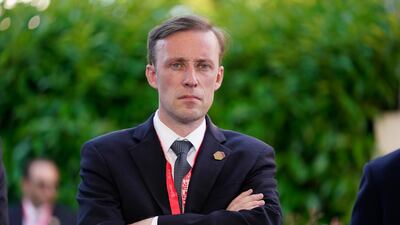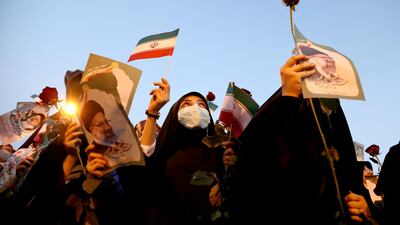US National Security Adviser Jake Sullivan is playing down the impact that hardline cleric Ebrahim Raisi's recent victory in the Iranian presidential elections will have on Washington's ongoing nuclear diplomacy with Tehran.
"Whether the president is person A or person B is less relevant than whether their entire system is prepared to make verifiable commitments to constrain their nuclear programme," Mr Sullivan said in an interview to ABC that was broadcast on Sunday.
Although Mr Raisi won a decisive victory in the Iranian elections on Friday, Mr Sullivan said the ultimate decision about whether Iran returns to compliance with the nuclear accord in exchange for US sanctions relief lies with Supreme Leader Ayatollah Ali Khamenei.
“The ultimate decision for whether or not to come back lies with Iran’s supreme leader,” said Mr Sullivan.
“And he was the same person before this election as he is after the election.
“Ultimately, it lies with him and his decisions as to whether he wants to go down the path of diplomacy or face mounting pressure, not just from the United States, but from the rest of the international community.”
Iran has gradually scaled up its violations of the nuclear agreement since former president Donald Trump withdrew from the accord in 2018.
The United States and Iran have so far completed six rounds of slow-moving, indirect talks in Vienna aimed at determining which nuclear activities Tehran will have to suspend and which sanctions Washington will have to lift to return to compliance with the deal.
Delegations from the remaining signatories to the accord – the UK, France, Germany, Russia and China – convened in Vienna this weekend following Mr Raisi's election victory.
A staunch critic of the nuclear deal, Mr Raisi does not take office until August. While he is expected to undo many of the reformist policies enacted over the past eight years, Tehran may be able to reach a deal with the US during President Hassan Rouhani's final weeks in office – contingent on Mr Khamenei's blessing.
Israeli Prime Minister Naftali Bennett used Mr Raisi’s election to caution against a return to the nuclear deal.
“Raisi’s election is, I would say, the last chance for world powers to wake up before returning to the nuclear agreement and understand who they are doing business with,” said Mr Bennett. “A regime of brutal hangmen must never be allowed to have weapons of mass destruction. Israel’s position will not change on this.”
Amnesty International called on Saturday for Mr Raisi to face an investigation for crimes against humanity over his role in forcible disappearances and extrajudicial killings of prisoners in 1988 as well as a crack down on human rights in his current roles as Iran’s judiciary chief.














